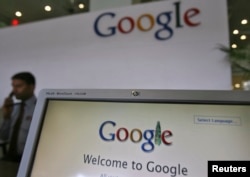As Facebook CEO Mark Zuckerberg testifies in front of Congress about the company's practices this week, Americans are waking up to just how much personal information tech companies have collected about them.
Facebook said it will begin notifying 87 million people this week whose information was handed to political consultancy firm Cambridge Analytica without their knowledge. Facebook has also instigated several changes to make it easier for users to control their data.
While these and other changes may reassure customers, they also keep the spotlight on the question that has made many Americans anxious: What personal information do tech companies like Google and Facebook have, and what do they do with it?
To find out, both companies offer multiple ways of checking on personal data and deleting it.
In addition, Facebook has begun letting individual users know whether their data ended up with Cambridge Analytica.
The company has provided a link for people to check for themselves whether their data – and what data specifically – was shared with Cambridge Analytica.
What Google knows might surprise some. If its "Location History" feature is turned on, the company knows the route of your bike ride from the day before and where you had dinner with the kids.
It keeps your search history and YouTube history, both searched and watched.
If you want to know all the apps that have access to your Google data, there's a quick way to check.
To find out everything Google knows, go to takeout.google.com or myaccount.google.com and click on "download all data." Under "control your content," you will be asked to create an archive. Depending on when you started to use Google, this process can take hours.
Google promises that "only you can see this data" and offers ways to zap individual chunks of data or whole categories, such as the search history. But the company also reminds users that deleting data may affect the ability of Google products and services to offer personalized help in the future.
With a new category under settings called "Accessing Your Information," the social media giant recently made it easier for a user to download his or her data.
Among the items that will be downloaded are posts, photos and videos, as well as all messages and chat conversations. The downloaded file also includes interests and other topics that advertisers may use to send targeted ads. In addition, it includes all advertisers with the user's contact information. Users can look at what third-party apps they log in by using their Facebook account.
If a user begins the process of deleting his or her account, Facebook takes a moment to show photos of people the person knows with a reminder that the person will "miss you" if the user leaves Facebook.
As consumers see their digital profiles, they may ask why this information is being collected and whether there should be new limits.
A recent U.S. poll found that 41 percent of Americans trusted Facebook to obey U.S. privacy laws. Users put more trust in Facebook's rivals — 66 percent trusted Amazon, and 62 percent trusted Alphabet, Google's parent company.





